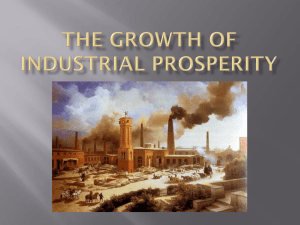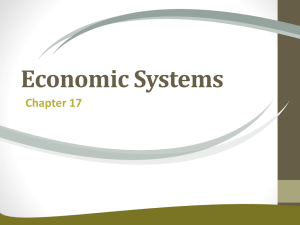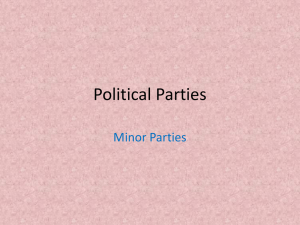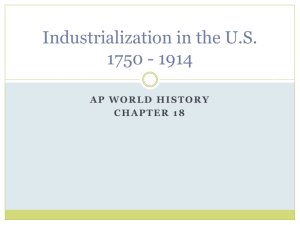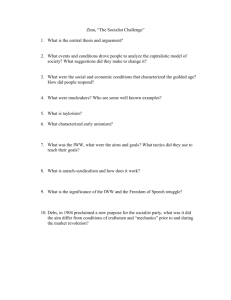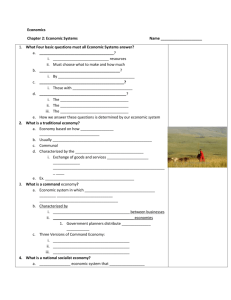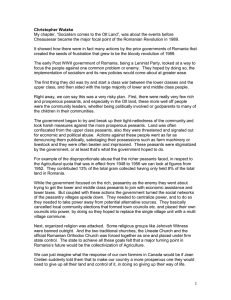Workers living in a workers' state: Industrialization, labor
advertisement
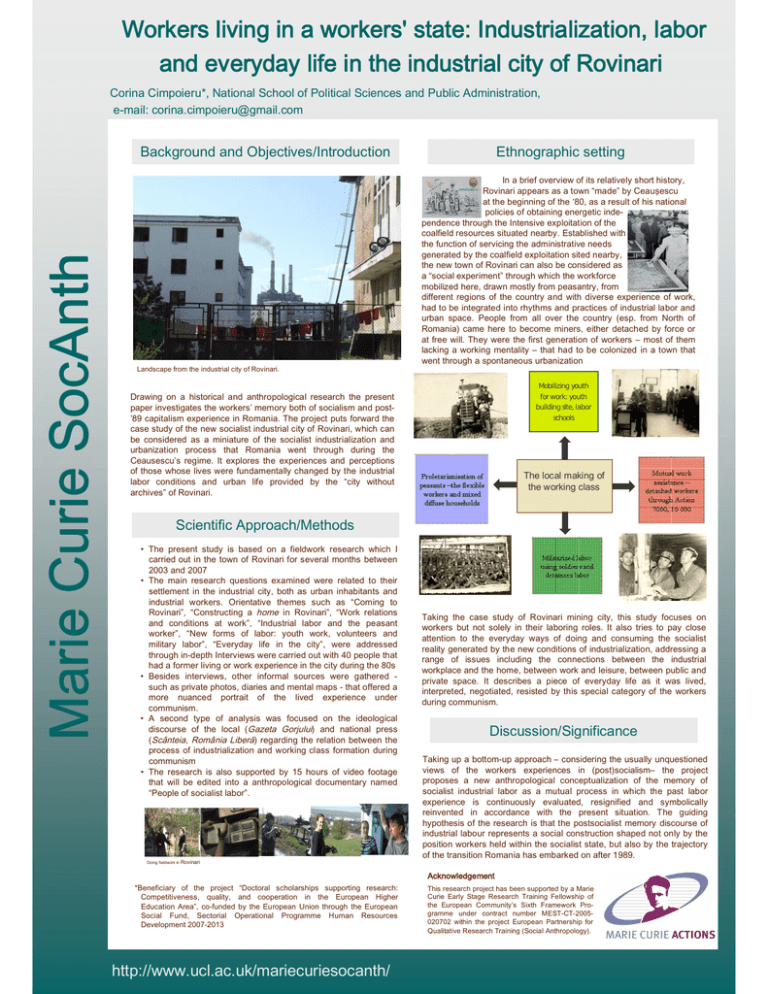
Workers living in a workers' state: Industrialization, labor and everyday life in the industrial city of Rovinari Corina Cimpoieru*, National School of Political Sciences and Public Administration, e-mail: corina.cimpoieru@gmail.com Marie Curie SocAnth Background and Objectives/Introduction Landscape from the industrial city of Rovinari. Ethnographic setting In a brief overview of its relatively short history, Rovinari appears as a town “made” by Ceau escu at the beginning of the ‘80, as a result of his national policies of obtaining energetic independence through the Intensive exploitation of the coalfield resources situated nearby. Established with the function of servicing the administrative needs generated by the coalfield exploitation sited nearby, the new town of Rovinari can also be considered as a “social experiment” through which the workforce mobilized here, drawn mostly from peasantry, from different regions of the country and with diverse experience of work, had to be integrated into rhythms and practices of industrial labor and urban space. People from all over the country (esp. from North of Romania) came here to become miners, either detached by force or at free will. They were the first generation of workers – most of them lacking a working mentality – that had to be colonized in a town that went through a spontaneous urbanization Mobilizing youth for work: youth building site, labor schools Drawing on a historical and anthropological research the present paper investigates the workers’ memory both of socialism and post89 capitalism experience in Romania. The project puts forward the case study of the new socialist industrial city of Rovinari, which can be considered as a miniature of the socialist industrialization and urbanization process that Romania went through during the Ceausescu’s regime. It explores the experiences and perceptions of those whose lives were fundamentally changed by the industrial labor conditions and urban life provided by the “city without archives” of Rovinari. The local making of the working class Scientific Approach/Methods • The present study is based on a fieldwork research which I carried out in the town of Rovinari for several months between 2003 and 2007 • The main research questions examined were related to their settlement in the industrial city, both as urban inhabitants and industrial workers. Orientative themes such as “Coming to Rovinari”, “Constructing a home in Rovinari”, “Work relations and conditions at work”, “Industrial labor and the peasant worker”, “New forms of labor: youth work, volunteers and military labor”, “Everyday life in the city”, were addressed through in-depth Interviews were carried out with 40 people that had a former living or work experience in the city during the 80s • Besides interviews, other informal sources were gathered such as private photos, diaries and mental maps - that offered a more nuanced portrait of the lived experience under communism. • A second type of analysis was focused on the ideological discourse of the local (Gazeta Gorjului) and national press (Scânteia, România Liber ) regarding the relation between the process of industrialization and working class formation during communism • The research is also supported by 15 hours of video footage that will be edited into a anthropological documentary named “People of socialist labor”. Doing fieldwork in Rovinari Taking the case study of Rovinari mining city, this study focuses on workers but not solely in their laboring roles. It also tries to pay close attention to the everyday ways of doing and consuming the socialist reality generated by the new conditions of industrialization, addressing a range of issues including the connections between the industrial workplace and the home, between work and leisure, between public and private space. It describes a piece of everyday life as it was lived, interpreted, negotiated, resisted by this special category of the workers during communism. Discussion/Significance Taking up a bottom-up approach – considering the usually unquestioned views of the workers experiences in (post)socialism– the project proposes a new anthropological conceptualization of the memory of socialist industrial labor as a mutual process in which the past labor experience is continuously evaluated, resignified and symbolically reinvented in accordance with the present situation. The guiding hypothesis of the research is that the postsocialist memory discourse of industrial labour represents a social construction shaped not only by the position workers held within the socialist state, but also by the trajectory of the transition Romania has embarked on after 1989. Acknowledgement *Beneficiary of the project “Doctoral scholarships supporting research: Competitiveness, quality, and cooperation in the European Higher Education Area”, co-funded by the European Union through the European Social Fund, Sectorial Operational Programme Human Resources Development 2007-2013 http://www.ucl.ac.uk/mariecuriesocanth/ This research project has been supported by a Marie Curie Early Stage Research Training Fellowship of the European Community’s Sixth Framework Programme under contract number MEST-CT-2005020702 within the project European Partnership for Qualitative Research Training (Social Anthropology).
